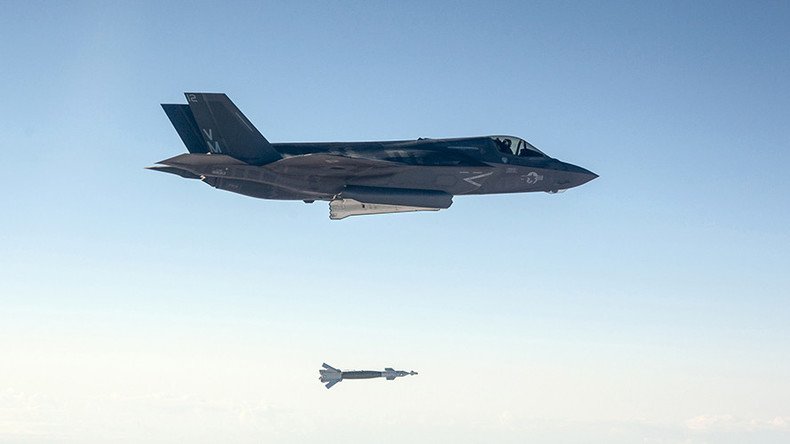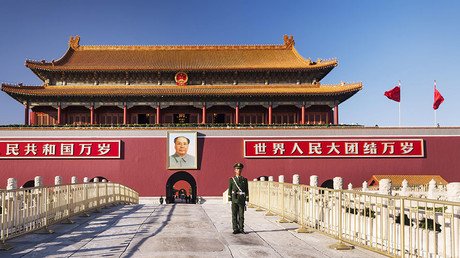Hawkish Graham warns of US ‘military option to destroy N. Korea,’ 1,000s will die ‘over there’

There is a military option for the US to destroy North Korea itself and stop “madman” Kim Jong-un, leading Republican Senator Lindsey Graham said, adding that if the war breaks out, thousands of people are going to die “over there, not here.”
Speaking on NBC News, Graham (R-North Carolina) said President Donald Trump told him personally he would be willing to go to war in North Korea.
“There is a military option – to destroy North Korea’s program and North Korea itself,” Graham said on Tuesday morning.
“He’s not going to allow – President Trump – the ability of this madman to have a missile to hit America,” he added, referring to North Korean leader Kim Jong-un. “If there is going to be a war to stop him, it will be over there. If thousands die, they are going to die there – they're not going to die here.”
.@MLauer: What's the best military option?@LindseyGrahamSC: To destroy North Korea’s program & North Korea itself https://t.co/P6mwiUmQkk
— NBC News (@NBCNews) August 1, 2017
The hawkish Republican then struck a conciliatory tone, saying, “President Trump doesn’t want a war. The Chinese can stop this.”
Graham usually acts in tandem with Senator John McCain (R-Arizona), but the former Navy pilot is currently at home in Arizona recovering from brain cancer surgery, after he went to Washington last week to sink a healthcare reform proposal championed by the White House.
Foreign policy in the US is squarely in the domain of the executive branch. However, the Senate recently sought to limit Trump’s options by passing a bill imposing sanctions on North Korea, Iran and Russia that the president could not undo without congressional approval.
Schumer to Trump: Block all deals involving Chinese buyers until China gets tough with North Korea. pic.twitter.com/BaiXZrZdAL
— Kyle Griffin (@kylegriffin1) August 1, 2017
Another senator who shares that opinion is Charles Schumer (D-New York), leader of the Democratic minority in the Senate. Schumer sent a letter to Trump on Tuesday, asking the president to suspend the approval of all Chinese mergers and acquisitions in the US in order to “send a clear message” to Beijing it needs to do more about pressuring North Korea.
“If China continues to passively address North Korea, I urge you to use your authority over the Committee on Foreign Investment in the United States (CFIUS) to suspend the approval of all mergers and acquisitions in the US by Chinese entities,” Schumer wrote in a letter dated Tuesday, copies of which were sent to several news outlets.
Meanwhile, in a Washington Post opinion piece, Senator Ted Cruz (R-Texas) advocated a revival of space-based missile defense to “outpace the North Korean threat by orders of magnitude.”
Cruz also stumped for a bill he co-sponsored, to “reach the reach the people of North Korea with targeted messages of hope and support, as well as examples of the freedoms we enjoy every day,” in order to undermine the country’s ruling ideology.
Last month, North Korea conducted two tests of a ballistic missile that may have intercontinental capabilities and the range to hit much of the continental US, according to US intelligence agencies.
Trump has sought China’s help in influencing the government in Pyongyang to stop its ballistic missile and nuclear weapons programs, starting with a summit meeting with Chinese President Xi Jinping in April.
Over the weekend, however, Trump tweeted he was “very disappointed” in China, saying it “does nothing for us with North Korea, just talk,” even after US leaders allowed Beijing to benefit from trade deals.
“We will no longer allow this to continue. China could easily solve this problem!” he added.
Beijing has rejected the “China responsibility theory,” with Foreign Ministry spokesman Geng Shuang telling reporters in early July that Washington was the one doing nothing about North Korea while expecting China to do all the work.
China has also rejected linking trade and the North Korean crisis.
“We think the North Korea nuclear issue and China-US trade are issues that are in two completely different domains. They aren’t related. They should not be discussed together,” Vice-Commerce Minister Qian Keming said on Monday, as cited by the South China Morning Post.












